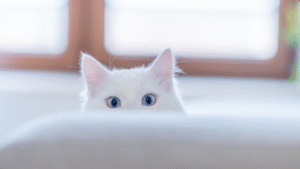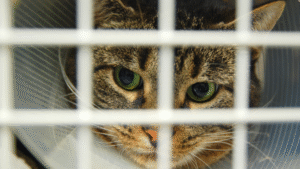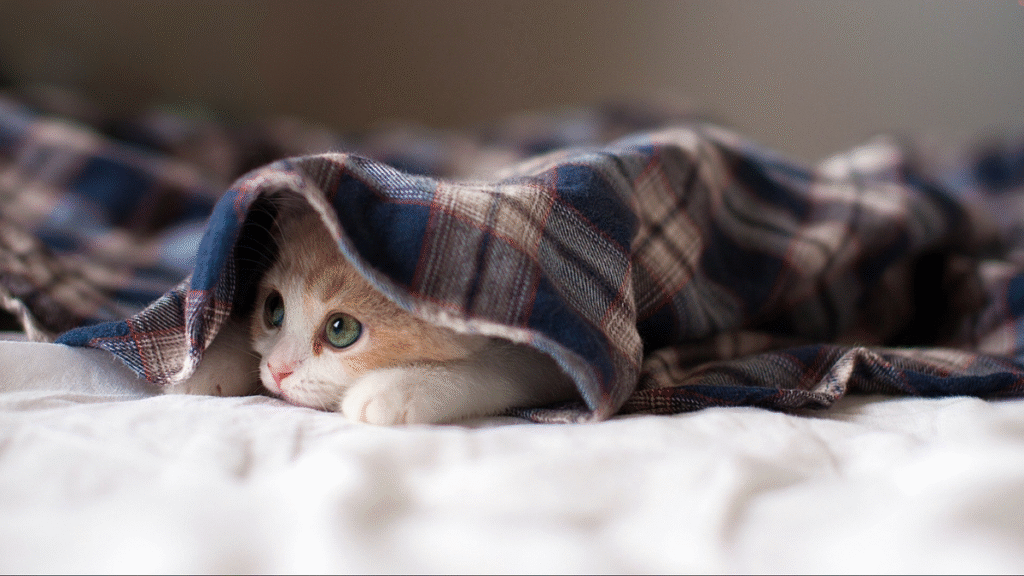Cats can be mysterious and independent creatures, but did you know they can experience anxiety too? Whether it’s caused by loud noises, a new house, the arrival of another pet, or even a disruption in their normal routine, cat anxiety is a common problem.
When your feline friend feels stressed or scared, they may react by hiding, becoming aggressive, refusing food, or overgrooming.
Thankfully, you don’t need to rely on harsh medications or stressful interventions to calm your cat. In this article, we’ll show you six natural ways to help an anxious cat feel more relaxed at home.

1. Set Up a Safe, Quiet Place
The first and most important step in soothing an anxious cat is providing them with a secure place to retreat. Cats are territorial animals that need a quiet, familiar space where they can relax.
If your cat doesn’t already have a safe place, create one. Set up a spare bedroom, a cozy corner, or even an area under a bed with soft bedding, a few toys, and an item with your scent, such as a t-shirt or blanket.
You can also add a cat tree, shelves, or a window perch in this space. Many cats feel more at ease when they can survey their environment from up high. Vertical territory gives them a sense of control and can greatly reduce stress.
The key is to make this safe place a judgment-free zone. Don’t force your cat out or attempt to play when they’re hiding—let them come out on their own terms. Over time, they’ll learn that this is their special sanctuary where they can relax and feel secure.
2. Use Calming Scents and Pheromones
Did you know cats communicate more through scent than any other sense? Certain smells can trigger relaxation and familiarity in your cat, while others can cause distress.
Synthetic pheromone diffusers (like Feliway and other natural options) are an excellent way to ease cat anxiety naturally. These diffusers mimic the facial pheromones that cats release when they’re happy and feel safe. Simply plug one into an outlet near your cat’s favorite spot, and within a few days, you may notice them becoming more relaxed.
In addition to pheromones, certain essential oils may have a mild calming effect—but be extremely cautious. Cats are very sensitive to scents, and many oils (including tea tree, eucalyptus, and citrus) are toxic to them. If you want to try natural aromatherapy, ensure that any essential oils you use are 100% pet-safe—lavender and chamomile are two that are generally considered safe—and always diffuse them in a well-ventilated room where your cat can leave if they wish.
As always, consult your vet before using pheromones or essential oils, and make sure you understand your cat’s sensitivities before introducing strong scents.

3. Keep a Predictable Routine
Cats are creatures of habit. Even seemingly small changes in their environment—like altered feeding times, litter box placement, or your work schedule—can cause anxiety.
Maintaining a consistent daily routine helps your cat feel more in control and less stressed. Feed, play, and interact with your cat at the same times each day. Simple habits, such as greeting your cat in the same way when you return home, can help them predict what will happen next. Predictability and a sense of control are key to a calmer cat.
If a change is unavoidable (such as moving to a new home), try to implement it gradually. Bring your cat’s favorite blanket, scratching post, or toys into the new space before they arrive. The more familiar items they have in a new environment, the more secure they’ll feel.
4. Ensure Playtime and Physical Stimulation
Boredom and excess energy can both contribute to anxiety. Regular playtime helps your cat release pent-up energy and provides much-needed mental stimulation to keep them happy and emotionally balanced.
Use toys that mimic the movements of prey—such as feather wands, laser pointers, or small toy mice—to engage your cat’s natural hunting instincts. This type of play not only relieves stress but also helps build confidence.
Try to schedule interactive play sessions lasting at least 10–15 minutes, twice a day. End each session with a small treat or meal. Completing the “hunt-catch-eat” cycle reinforces feelings of satisfaction and calm.
If your cat spends time alone during the day, provide puzzle feeders or treat-dispensing toys to keep their mind occupied. Challenging their brain is just as important as physical exercise for maintaining emotional balance.
5. Try Natural Supplements and Herbal Remedies
Natural supplements can be a gentle yet effective option for helping your cat manage anxiety. There are several herbal and nutritional remedies that promote calm behavior in cats.
Some of the most popular natural remedies for cat anxiety include:
-
Chamomile: Known for its soothing properties, chamomile may help alleviate mild anxiety in cats.
-
Valerian root: A common herb that reduces nervous tension in both humans and pets.
-
L-theanine: An amino acid found in green tea that promotes relaxation without causing drowsiness.
-
CBD oil for cats: Extracted from hemp, CBD may help reduce stress and promote a sense of well-being. Always choose a vet-approved, THC-free formulation specifically designed for cats.
Before starting any supplement or herbal remedy, always consult your veterinarian. Even natural supplements can cause side effects or interact with medications, so it’s essential to ensure proper dosage and safety.
When used correctly, these natural options can help keep your cat calm and balanced without the need for heavy sedatives.

6. Gain Their Trust and Offer Gentle Reassurance
Anxiety in cats often stems from fear—fear of people, other animals, or past trauma. The best natural remedy for fearful or shy cats is time and patience.
Avoid forcing interaction. Let your cat approach you first. Sit quietly in the same room, speak softly, and offer treats from a distance. Over time, your cat will begin to associate your presence with safety and positivity.
Another useful technique is the slow blink—often called the “cat kiss.” Slowly close your eyes, then open them again while looking at your cat. This signals peaceful intentions. If your cat blinks back, it’s a sign of trust and comfort.
Gentle physical contact can also be soothing, but only if your cat invites it. Pet along the back or under the chin—never the belly unless your cat specifically enjoys it. Gentle touch can release endorphins and reduce tension.
Building trust takes time, especially with rescued cats or those who’ve had negative experiences in the past. However, the bond that grows from consistent kindness and patience is one of the most powerful natural treatments for anxiety.
Bonus Tip: Keep the Environment Calm
Your home environment can have a big impact on your cat’s emotional well-being. Loud noises, strong smells, and general chaos can overwhelm a sensitive cat. Try to maintain a calm, stable atmosphere whenever possible.
Keep loud music, television, and conversations at moderate levels, and ensure your cat’s safe space is accessible when you have guests. This gives them a quiet retreat when the house gets busy. Avoid sudden movements or yelling—even small disruptions can trigger a nervous cat’s anxiety.
Soft music or white noise can also help mask outside sounds. Some cats even enjoy watching nature videos or listening to gentle classical music, which can help them feel calm and engaged.

Final Thoughts
Helping an anxious cat takes time, patience, and understanding. You may not see results overnight, but with a combination of these six natural strategies, you can help your cat feel more relaxed and comfortable at home.
By creating a calm environment, maintaining consistency, and showing empathy, you’ll not only reduce your cat’s anxiety—you’ll also strengthen the bond between you and your feline friend.
Save pin for later

- Why Cats Avoid Eye Contact - January 31, 2026
- How to Stop Cats From Climbing Where They Shouldn’t - January 31, 2026
- Why Dogs Get Hyper at Night - January 31, 2026
